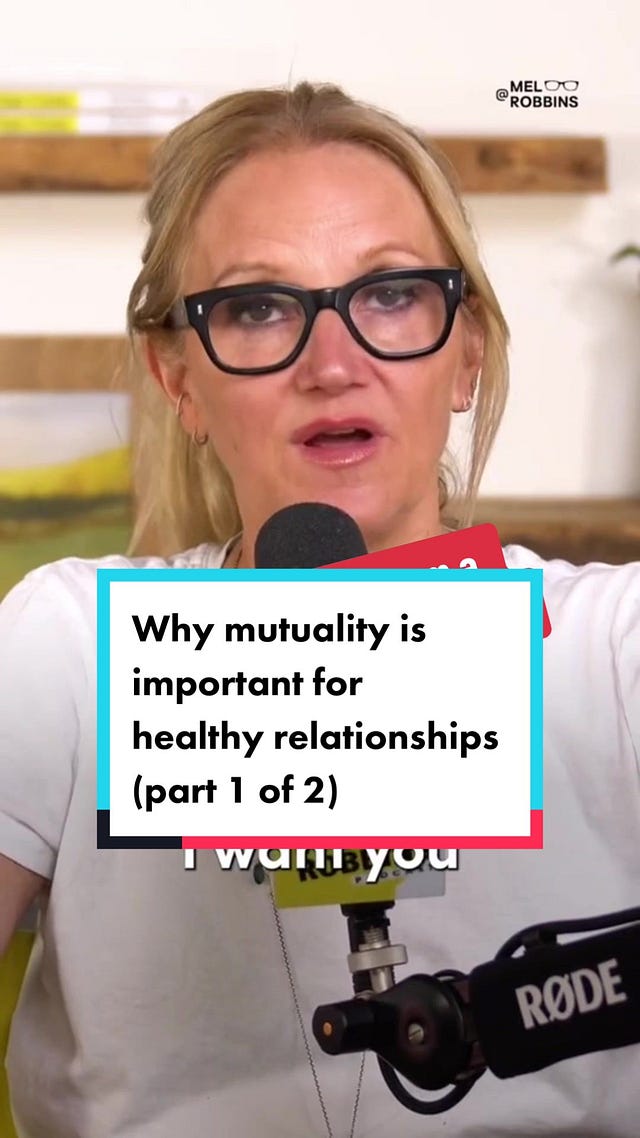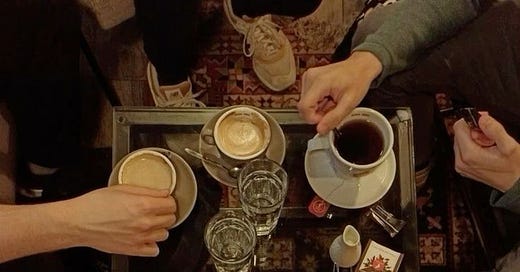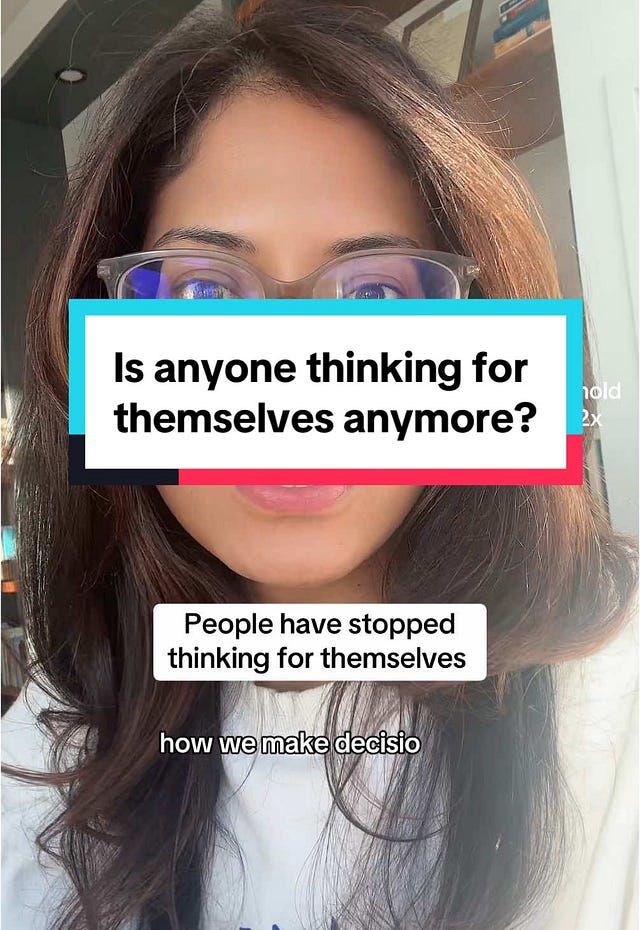A good life is inconvenient.
We need to escape the cult of convenience
Community Monthly Meet-Up: In Sessions
April 29th, 630 pm ET: The Weight We Carry: Guilt, Goals, and the Grace of Letting Go
Subscribe to attend
It now takes less than 30 seconds to get groceries delivered to your doorstep. No conversation, no walk, no weather. What once required community—running into your neighbor at the store, borrowing sugar, chatting with the clerk—is now entirely solo. Effortless. But in this seamlessness, something has quietly eroded. Connection. Interdependence. The small frictions that used to tether us to one another.
Being in community is romantic in theory—but inconvenient in practice. It requires time, patience, and the willingness to experience discomfort. It asks you to show up even when it’s awkward. To talk through conflict instead of avoiding it. To not just “let them” walk all over your needs or your boundaries for the sake of harmony—but also, to not immediately cut people off the moment they disappoint you.
This is the paradox of convenience: it promises more time, more ease, more freedom, but often delivers the opposite. The more we optimize, the more we isolate. The more frictionless our interactions become, the less real they feel. Convenience has become the organizing principle of modern life and I can’t help but wonder: can a convenient life really be a happy one?
A meaningful life is often inconvenient—and that’s what makes it good. It asks for effort, for presence, for staying when things aren’t easy. If we want to feel rooted, purposeful, and less alone, we need to reclaim a little inconvenience.
Instead of a coherent philosophy, we are left with a marketplace of ideas where wisdom is just another commodity — packaged, consumed and discarded with the next trend. - Modern life leads nowhere.
The cult of convenience
In a world where vulnerability is seen as a liability, we’ve become fluent in “therapy-speak”, a language originally meant for healing, now often deployed to defend our distance. Words like “boundaries,” “triggered,” and “energy” are used less to move toward connection and more to justify avoidance. Of course, boundaries are essential, but in the cult of convenience, they can easily become rigid walls that keep discomfort (and intimacy) at bay. We ghost instead of clarify. We pull back instead of repair. Emotional labor is seen as something to opt out of, rather than a mutual investment in any meaningful relationship.
 Tiktok failed to load.
Tiktok failed to load.Enable 3rd party cookies or use another browser
Driverless cars, grocery deliveries, voice-to-text, automated everything - in many ways, these innovations have created real ease: more accessibility for disabled individuals, saving time for overworked parents, and access to necessities in food deserts and during public health crises. Convenience can be an equalizer. It can offer relief. But when ease becomes the default measure of value—when “fast” and “frictionless” are always better, we lose something critical: the slow, inconvenient texture of real life and real relationships.
This is the culture we’ve built, one that tells us convenience is king, that needing people is weak, and that time is only valuable if it is optimized. But this cult of convenience carries a cost: our relational muscles have atrophied, and our tolerance for the messy, beautiful work of being in community has all but disappeared.
Readings:
Jenny Odell’s How to Do Nothing
Sherry Turkle’s Alone Together
Cal Newport on “solitude deprivation”
Eric Klinenberg’s Palaces for the People
What is a ‘Good Life’? Re-centering meaning and connection
Purpose through participation asks us to move beyond our Self as the sole way of meaning-making. When we care for a friend, cook for a neighbor, volunteer, create, contribute, listen: these are acts of purpose. Meaning is revealed through mutual investment. As Viktor Frankl wrote in Man’s Search for Meaning, purpose is often born from responsibility to someone or something beyond ourselves. It is not just introspective; it is connective. He writes, “The more one forgets himself, by giving himself to a cause to serve or another person to love, the more human he is.”
And yet, modern life encourages us to treat even purpose as something to produce. We commodify our passions, monetize our hobbies, and optimize every moment in service of value and output. This is the trap of purpose through productivity, the belief that our meaning must be tied to what we can prove, show, or earn. But what if rest, presence, and small, unseen acts of care were meaningful?
Decentering productivity means reclaiming time for relationships, reflection, and repair, things that may not be “efficient,” but are profoundly necessary.
Meaning is not a feeling. It is an act of awareness, followed by action, followed by integration. It’s the process of aligning our inner values with our outer life. That’s what creates lasting change; internally, and in the world around us.
Readings:
All About Love – bell hooks
Bowling Alone – Robert Putnam
The Lonely Century – Noreena Hertz
The Art of Gathering – Priya Parker
The collapse of communal life
The slow death of third spaces is a key part of this shift towards individualism. Historically, third spaces referred to the communal environments that existed between home (the first space) and work (the second space): places like cafés, libraries, parks, religious centers, barbershops, and community halls. These were spaces where people gathered not to consume, not to perform, but simply to be with each other - to talk, observe, share news, play chess, organize, or do nothing together. They were the living rooms of public life.
What really threatens community isn’t just the loss of physical gathering places, it’s the ideology we’ve internalized: hyper-individualism. The myth of self-sufficiency has taught us that to need others is to be weak. That boundaries must always come before repair. That asking for help is embarrassing. That emotional discomfort is a sign something’s wrong, rather than a normal part of being in relationship. This mindset is reinforced by a culture of hyper-speed, where productivity trumps presence and efficiency is prioritized over empathy.

 Tiktok failed to load.
Tiktok failed to load.Enable 3rd party cookies or use another browser
Individualism leads to a mindset of ‘let them’, which can be beneficial sometimes. But, if you always “let them,” you stop holding others accountable. But more importantly, you stop learning how to do it. You miss the opportunity to practice conflict resolution, to express hard emotions like disappointment, resentment, or the desire for change. Community is where we learn emotional regulation—where we sit with our triggers instead of reacting to them, where we develop the skills to name our feelings, listen without defensiveness, and co-create repair. None of that is fast or easy. But all of it is necessary.
"I owe nothing to anyone" is making us lonelier
Look, I’ll be the first one to tell you that it’s important to prioritize yourself. It’s important to think about yourself and how your choices affect you first. It’s important to protect your peace, energy, and time.
Choosing the inconvenient path
Building a more connected life isn’t just about finding more time, it’s about choosing a different way of living, over and over again. Here are small but meaningful mindset and behavior shifts to help you reconnect with others and rewire your relationship to community, purpose, and presence:
De-centering productivity: Practice doing something simply because it brings you joy or closeness—even if it feels like a “waste of time.”
Relearning interdependence: Text someone and ask for a small favor (a ride, a recipe, advice)—notice how it deepens connection. Offer help before it’s asked: bring soup, share resources, check in unprompted.
Make time, don’t find it: Schedule recurring connection rituals: Sunday dinners, monthly walks, rotating potlucks.
Accepting discomfort: Practice conflict resolution instead of avoidance: say “This mattered to me,” or “Can we talk about what happened?
Understand your tolerance spectrum: Use these questions to discern when the discomfort is generative:
Does this deepen care?
Does this stretch or expand my emotional capacity?
Does this build reciprocity, rather than transaction?
Is the discomfort a signal of growth—or a boundary being crossed?
How to Be in Community (Even When It's Hard)
What if purpose isn’t something we find, but something we participate in? Meaning doesn’t happen in a vacuum. It is shaped in relation, through the push and pull of being with others, through showing up, through being witnessed, through witnessing. A life of meaning is not self-contained. It is interwoven.
Initiate: Start a recurring group or dinner.
Invite three friends or neighbors to a monthly potluck or "first Friday" dinner. Keep it low-pressure—everyone brings what they can, no cleaning required.
Show up: Even when you're tired. Especially when you're tired.
You RSVP’d to a friend’s small gathering, but now you’re tempted to cancel. Go anyway. Stay for an hour. Being there matters more than being perfect.
Ask open-ended questions, and stay for the answer.
Instead of “How are you?” ask, “What’s been on your mind this week?” Then pause. Let silence do some work. Don’t pivot the moment they finish.
Offer things without expecting return.
Drop off homemade soup when a friend is sick, without asking first. Offer to watch someone’s kid while they rest. Venmo someone for coffee just because.
Normalize slowness, imperfection, and effort.
Host a gathering where not everything is clean or “put together.” Send a check-in text a week late and say, “I know I’m late, but I’ve been thinking of you.” Invite someone even if they’ve declined before.
A good life asks something of you.
A good and full life asks for your time, your attention, your discomfort, your presence. It asks you to show up, not when it’s convenient, but when it matters. And it asks you to stay, even when staying is awkward, effortful, or unrewarded in the ways you’ve been taught to expect.
We’ve been sold a story that ease is the goal. That faster is better. That alone is safer. But in the pursuit of convenience, we’ve lost the very things that make life meaningful: community, connection, slowness, care. These things are inconvenient. They will interrupt your schedule. They will stretch your emotional range. They will invite you to unlearn habits of control and certainty.
But they will also change you.
So this is your invitation: choose the good over the easy. Embrace the friction. Lean into the awkward pause. Linger in the extra moment. Say yes, even if it takes a little more effort. Let yourself be interrupted—because sometimes, the interruption is the sacred thing.
That’s all for now! May your tables, health, and happiness be always in abundance.
Live well + be well xx,'
Israa
[Ps. My book, Toxic Productivity, is available everywhere books are sold. You can learn more about it here: https://www.israanasir.com/toxic-productivity ].











What an incredible read. Definitely a lot to digest. Grateful to have access to read such work! I enjoyed that part about doing things without asking - dropping off soup to a sick friend. I feel we sometimes wait for others to tell us they need help before we offer it. Can’t wait to start implementing these
points in to my life!
With love,
Thebondbetweenus
This was a really good morning read. Thank you for sharing your words!